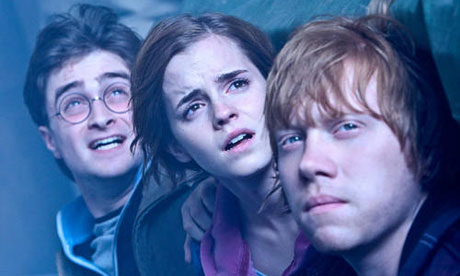
The tagline for the latest, and last, Harry Potter movie is brutally simple. On Friday 15 July, the posters tell us, 'It all ends.'
Its detractors may celebrate, or, more likely, breathe a sigh of relief, but for fans of Harry Potter, this is a simultaneously sad and thrilling moment – on the one hand, we will get to see the franchise reach its epic conclusion; on the other hand, there will be no more Potter movies. For good or ill, 15 July will be a cinematic landmark in the lives of millions of viewers who grew up with Harry Potter, but it also constitutes a potential troubling milestone for Warner Bros, who fund and distribute the films.
The Potter movies have been a remarkable commercial and cultural phenomenon. Since 2001, they have generated almost $5.5bn in global revenues (roughly £3.4bn), a figure which does not include takings from DVD sales, licensing deals, etc. Consequently, these films alone have secured Warner Bros position as a major studio, and insulated them against many of the potential financial problems that have recently hit the movie business – such as the declining DVD market, and retraction of credit opportunities.
To some extent, the astounding commercial success of the Potter movies can be attributed to the relatively daring approach that the studio has taken towards their production. Despite being multimillion-dollar, multinational concerns, the Potter movies have stayed remarkably true to Rowling's original novels, and they have also developed a distinctive tone of their own. They are, in some intangible way, very British. They are also fairly arty in the way that they look. The dark visual tone introduced in the third film is now a constant feature of the franchise, and the later films seem to have embraced a relatively downbeat, naturalistic approach to the story – witness the lengthy scenes of unhappy teens camping in the last film.
So, I would argue that the films exhibit a relatively high degree of artistic invention for a big budget family orientated product. In part, this can be attributed to the producer, David Heyman, and the directors, especially David Yates, who has overseen the last four films. However, the distinctive look and tone of the movies is also the product of Warner Bros' decision to defer control of the production to a small British team – Heyman's Heyday Films, based in London. Heyman, who first negotiated films rights from JK Rowling, seems to have been allowed to make the films pretty much as he sees fit. At some point, Warner Bros president Alan Horn resisted the urge to interfere heavily with the production process, and as a result, the Potter movies developed a distinct tone, and have remained popular.
Leaving the producer and director alone sounds easy, but in the high stakes game of film production it takes remarkable guts. Distributors invest enormous amounts of money in movies, and they often want to minimise the risks involved by including marketable elements and obviously appealing story points. This kind of film-making by committee is the product of institutional anxiety, and it can ruin mainstream films – look at Columbia's Spider-Man 3. Over the last 10 years, Warner Bros has adopted the bold commercial strategy of handing creative control of major franchises over to visionary film-makers. The strategy began in earnest with Peter Jackson's Lord of the Rings movies, while Potter continued the trend (especially when the director Chris Columbus was replaced by Alfonso Cuarón for the third film). Another example is the soon-to-be-concluded Batman franchise overseen by Christopher Nolan – a British writer/director/producer with a singular vision and genuine claims to auteur status. As with Potter, Nolan has been given remarkable autonomy to make his Batman movies as he wishes, and Warner Bros has reaped the benefits.
Taken together, there is strong evidence that audiences respond best to distinctive, well-crafted movies, even when those movies are big budget blockbusters. Other studios are now adopting Warner Bros' strategy wholesale, as indicated by the recent release of Kenneth Branagh's Thor and Matthew Vaughn's X-Men: First Class. However, for Warner Bros, the end of Potter also seems to mark a move into choppier waters. The decision to give big budget franchises the auteur treatment was made under the aegis of president Alan Horn, who is leaving. What's more, there will be no more Potter, which will literally remove almost a billion a year from the company's revenue stream.
Recent decisions regarding key franchise properties also seem less assured – Zack Snyder, who has presided over a run of critical and commercial disappointments in recent years, has been appointed as director of a Superman reboot. Incoming president Jeff Robinoff has claimed that Batman will be rebooted after Nolan departs, indicating a move away from the tone that has engaged so many viewers in the last few years. Production has finally begun on Peter Jackson's The Hobbit, but Jackson is no longer a sure-fire bet, and most of his recent films have been critical or commercial disappointments. Perhaps worst of all, the current Green Lantern movie seems to suffer from many of the problems that Warner Bros had successfully sidestepped in the past – it emphasises the character's brand over the story, its visually undistinguished and narrationally uneven. It is a film that looks to have been made by committee, when Warner Bros had previously done a good job of releasing major blockbusters with a more distinctive edge.
So, while Potter fans may be lamenting the end of the franchise on 15 July, I would guess that the lamentations will be equally intense over at Warner Bros, no matter how much money the final film makes. Deathly Hallows Part 2 will answer many fans' questions, but it will pose many more for the executives at Warner Bros.
• This article was amended on 28 June. The original stated that Fox distributed Spider-Man, rather than Columbia. This has been corrected.

